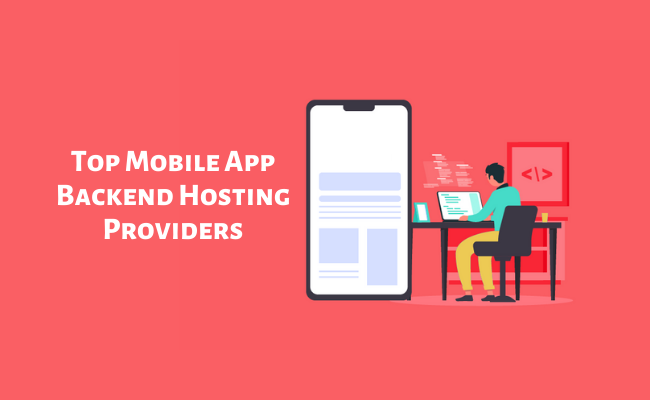
Backend hosting providers are in high demand as mobile app usage increases. They are crucial for any company that wants an app because they provide the infrastructure to handle data for mobile apps. With that said, do you know what are the best mobile app hosting service providers?
When it comes to finding a reliable solution to host your own mobile apps, many different options are available on the internet.
In this article we will list the best mobile backend hosting providers out there – with their pros and cons. Let’s get started without any ado!
Best Mobile App Backend Hosting Providers
1. Firebase
Firebase has been in the market for years, and it never looked back after Google acquired it in 2016. The overall functionality of Google Firebase makes it one of the best mobile app hosting service providers on the market.
No one seems to beat Firebase when it comes to getting rid of bugs that cause users to uninstall apps.
Everything from its robust Application Program Interface (API) to a scalable software development kit makes it one of the best mobile app hosting service solutions.
Pros
- Excellent SDK documentation
- Tracking errors is hassle-free
- Highly secure cloud storage service
- Relatively Inexpensive
Cons
- Customer care support needs improvement.
2. AWS
AWS is another best mobile app hosting service offered by the retail giant Amazon. AWS allows you to host your apps in the cloud and does not require any setup or maintenance.
Moreover, the virtual server Lightsail is the perfect solution for people looking for web-based hosting.Their mobile app hosting services also offer a wide range of scalable features, with different storage types and data transfer options available depending on what you need for your business.
Pros
- Secure SSL for free
- The visitor bandwidth capacity of up to 7 TB
- Customized solutions
- Perfect for low-medium traffic apps
Cons
- Expensive
3. Kinvey
Kinvey is an established backend as a service (BaaS) provider. This platform is great if you are looking to get your app off the ground quickly. It doesn’t matter whether you know or don’t know the technical aspects involved in hosting an application because a highly efficient hosting structure handles everything.
Everything from setting up the server to seamless connectivity across cloud services and dependable tool support makes it stand out.
Consider the following factors when choosing this top-notch mobile app hosting company.
Pros
- Compatibility with HTML 5 and hybrid apps.
- Straightforward JSON datastore
- Promises simplify JavaScript client code
- Features authorization links
- Simplified costing plans
Cons
- The external configuration creates hassle during push support.
4. Backendless
Backendless is an app development platform that provides its users with access to an open-source, RESTful API. The ability to customize backend logic makes Backendless one of the best mobile app hosting service solutions worldwide.
With the help of their platform, you can easily build and deploy mobile apps in no time at all – it’s as simple as copy-pasting pre-built code blocks into your app project. In addition, they offer an amazing user experience with a powerful backend that is built from scratch.
Here are some feature highlights:
Pros
- Hassle-free push notification management
- Custom code can help you customize the backend logic.
- Rapid transfer of data across platforms
- User-friendly APIs
Cons
- Expensive
5. Heroku
Heroku is a cloud platform as a service (PaaS) software and allows developers to build and run applications in the cloud. The tool is very user-friendly and supports multiple programming languages, also offers a wide array of tools to streamline the development and deployment process.
Heroku is a developer-friendly platform with reduced complexity around application deployment and management. Its support for multiple languages, a huge number of add-ons, and a scalable infrastructure make it a versatile tool for many use cases.
Developers, however, have to take in other factors like cost implications and possible loss of control when considering if Heroku is the proper fit for the application in question.
Pros:
- Very user-friendly
- Strong developer tools
- Extensive add-on ecosystem
Cons:
- Can be expensive at scale
- Limited to the resources of the dynos
6. Back4App
Back4App is a cloud platform that helps you easily build and host the backend for your mobile and web applications. It uses the open-source Parse Server, which is known for being simple and flexible.
Back4App is best for smaller companies who want to launch apps without much investment in backend infrastructure. It offers a free tier and competitive pricing, making it a good choice for startups and small projects.
Pros:
- Easy to use
- Open-source flexibility
- Scalable and cost-effective
Cons:
- Limited to features of Parse Server
- Smaller community compared to Firebase or AWS
7. Azure Mobile Apps
Azure Mobile Apps, is a cloud service from Microsoft for building and hosting the backend of both mobile and web applications. It offers developers a long list of features to manage and scale applications easily.
You can synchronize information across different devices, store information on cloud and users can access the data both online and offline mode. Changes made offline are eventually updated once the device connects to the Internet.
Pros:
- Integrated with Azure ecosystem
- Strong enterprise support
- Comprehensive security and compliance
Cons:
- Can be overkill for small apps
- Learning curve for Azure services
Conclusion:
Each of the backend hosting providers mentioned above offers unique features for different needs, budget, and technical expertise. Firebase and AWS are excellent for scalable solutions, while Back4App and Heroku offer more user-friendly and flexible options.
Kinvey is best for enterprise and marketing-focused apps, Backendless provides MBaaS solutions and Azure Mobile Apps is a strong choice for enterprise-level applications.
Also Read:
